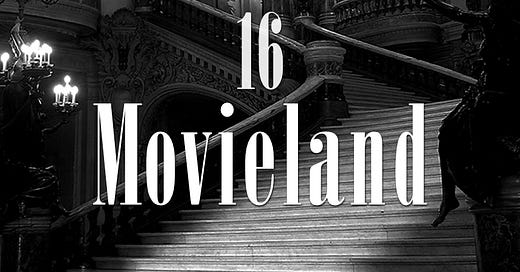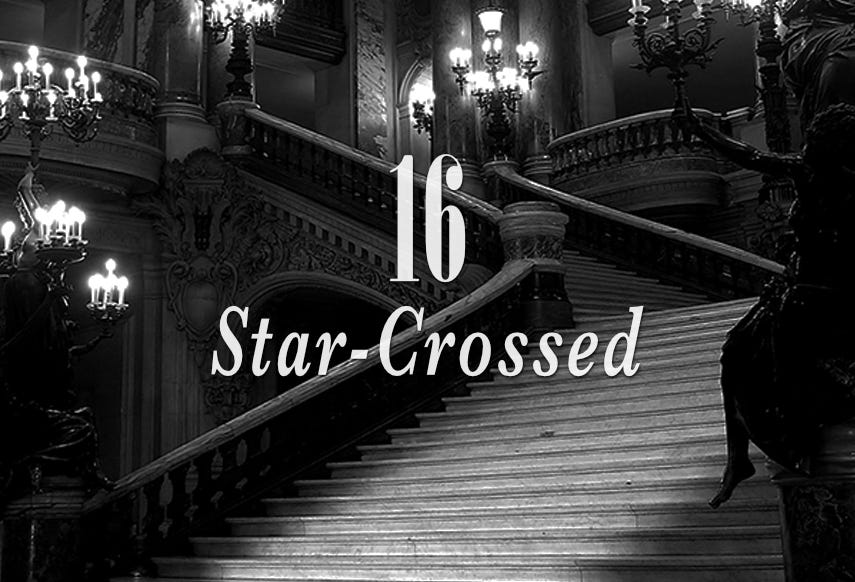Ill met by daylight.
16
Star-Crossed
A shadow fell across her lap.
"Is your name Eden?"
Eden looked up, startled. Still breathless, she had found refuge in the lobby and was sitting on one of the low Roman divans. Before her stood a young soldier.
"It is Eden, isn't it?"
Did he know her? Did someone in this place actually know her?
“Are you alright?” he continued. “Excuse me for saying this…”
She studied his face.
“But you don’t look well at all. I saw you sitting over here, and…”
As he spoke, Eden realized he did look familiar. He had a shy smile and large eyes —well, the shaved-to-the-scalp military haircut exaggerated the eyes, made them seem darker and more penetrating than they should be. But there was something familiar about the apologetic smile. He extended his hand.
“Can I get you something?”
It was almost as if he had read her mind, for she had nearly collapsed on the divan, exhausted. “If you would be so kind,” she replied. “There’s a water fountain over there. And some paper cups.”
“On it,” he said before she could finish.
She watched him as he went. He looked tall and spruce in his tan uniform. Where did she know him from? Her memories of San Francisco were muffled in a fog of their own. This was a fresh face, and she had the feeling she had seen it recently. A student, perhaps, one of the ones who had flowed into the front seats while she waited for the lecture to begin. The way a face can catch your eye when you’re not really paying attention.
He returned with two paper cups and leaned down to hand her one. My, he was tall!
“May I join you,” he asked, and when she nodded, he sat on the other end of the divan. He was very polite, she thought. And quite fastidious. He looked utterly clean and pink as if he had scrubbed his skin with wire brushes. He was sunburnt too, and the tint had that high color that suggested he was recently at the beach. His ears, especially, which were small and lay flat against his bristled scalp, were the blushing pink of seashells.
“How did you know my name?” she asked.
“I heard it in the theater.” His voice had a soft, pleasant lilt. “I heard it when you said it.”
She had? No, she hadn’t. She gave him a bewildered look. “You must mean Tom. Professor Day. He must have said my name. You must be thinking of him.”
“Am I.” The way he said it, it was not a question.
Eden took a sip of water. So that was it. The soldier must be one of the early students who came in when Tom was speaking to her in low tones on the stage.
Except…
Except she had the impression that the soldier had entered the theater only just now. When she first got to the lobby, sitting there in dismay, feeling sick, she was vaguely aware of people passing beyond the glass doors, on Pineapple Street. Among them was someone in all tan, possibly this soldier in his uniform. And wasn’t there a whoosh and a drift of warm air right before he spoke, as if someone had just come in through the glass doors?
It was strange.
They sat in silence, sipping their water. The Murder on the Stairs was coming back to her, and she began to massage her temple as if to rub out the images, when he said, “You’re having trouble breathing, aren’t you?”
The observation made her self-conscious. With Tom to lean on, she could almost ignore how often she had to sigh after she caught her breath. The earnest way the young soldier was looking at her made her feel an answer was expected.
“I had a bit of a shock,” she said. “The movie —”
“Oh, I thought it might be the air.”
Her eyes went wide with surprise. That was the real reason, but she hadn’t wanted to explain herself to a stranger. “Why … yes,” she said. “Something wrong about the air here. Do you feel it too?”
“Like it’s weighing down on you all the time?”
“Yes!”
“People say it’s the smog,” the soldier confided. “I’ve read it’s the way the mountains trap in the car fumes. Well, I’m from a small town that’s way up above sea level, and the air is so clear you can see the veins of silver ore on the mountaintops. I had a terrible time my first day here. I had to put my mind to it, you know, to breathe it in, to just handle all this … filth. I’m sorry, but that’s what it is.” He leaned in closer, lowering his voice. “You see it everywhere! You breathe it in everywhere!”
There was something too intimate about the way he was whispering to her, and she pulled back. Eden wondered if she was supposed to say something now? She didn’t like talk of filth. It seemed to have embarrassed him too, for she thought his pinkness had reddened (it was hard to tell), and he was looking down at his hands, clasped around the paper cup.
She looked away, feeling the tense silence. You had to think before you spoke here. You had to calculate. Gone was the inner certainty that words would just flow, be concise, advance the storyline. She waited but no words were coming, no words ready-made and nicely trimmed, only the stubborn impression that she had seen this face elsewhere, that it had loomed large. Is that how it would happen? Little things nudging their way back into her memory, fragments of San Francisco shedding the fog?
Self-consciousness was new for Eden, and she was wondering these things with a sense of discovery when she became aware that the sunburnt soldier had been watching her closely all this time. Now, as if there had been no lapse in the conversation, he said, “It’s like trying to breathe underwater.”
But this was extraordinary! That’s exactly how it felt!
“Breathing here,” he continued, his face pained, “it’s like trying to force something liquid into your lungs. Something thick and heavy … like syrup.”
“Yes! … it’s like…” She was about to say “ drowning” when a perplexing sense that she had done this before stopped her. The sensation of drowning…the deep, helpless inhaling of murky water. Then she remembered. She had said these very words right here, in this lobby, not two days ago.
“We have that in common,” he said.
“Pardon?”
“You and I … we’re not from here.”
The conversation, though accompanied by shy, diffident glances, was beginning to feel like an interrogation. She wished Tom were here. She wondered when the movie would end.
All this while, blurred dialogue from within the theater had seeped intermittently through the walls. Now the soundtrack picked up. Chilly violins. Subsiding and then shrieking, subsiding and then shrieking. Another murder on the stairs? Ominous cellos tumbled down upon each other. A body falling?
The movie had done something to her. Just hearing the music, even muddled like this, made her imagine the brutal stabbing again. Suddenly, the theater went silent. A silence so big and vacuous that Eden could hear herself struggling to breathe.
He spoke. “I know something about you that you don’t think I know.“ It sounded like a thing a child would say.
She shifted uneasily on the divan.
“We both…” He paused as a mischievous boy might, relishing the suspense. “We both had the same accident.”
Accident? “You … you fell into the San Francisco Bay too?”
“No,” he said with a surprised laugh. His voice dropped to a whisper. “I mean we're both stuck here.”
And again Eden wondered if they were really talking about something else.
The soldier in the tan uniform leaned in conspiratorially. “We both had the same accident of getting stuck in this crazy …”
He said the last word in a funny way. She had never heard “Los Angeles” pronounced like that.
Preview: Storm warnings.







